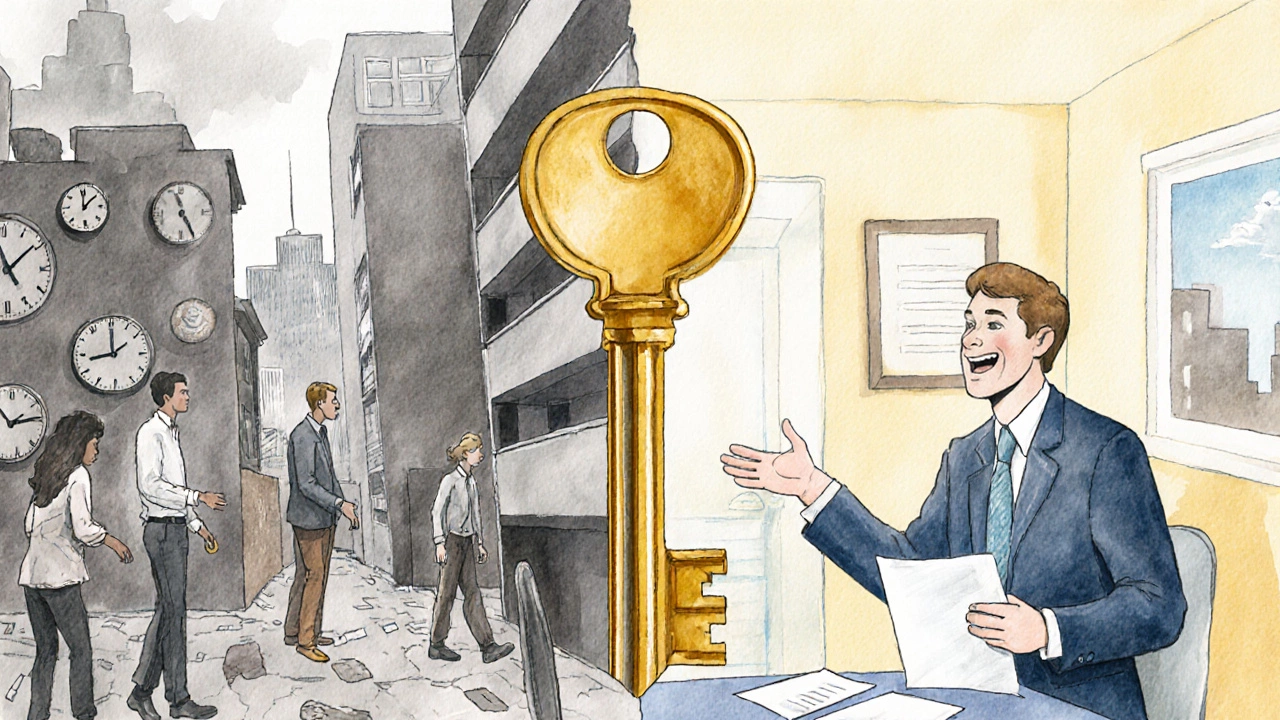London Broker Value Calculator
Calculate Your Broker Value
This tool helps you determine if hiring a broker is worth it based on your specific situation in London.
Every month in London, thousands of people scroll through Rightmove, Zoopla, and Facebook groups, hoping to find a flat without paying a broker. They’ve heard the stories: £300 fees for a two-bedroom in Peckham, a broker who ghosted after the deposit was paid, or a listing that vanished the second they called. So they ask: Is it worth paying for a broker? The answer isn’t yes or no. It’s about timing, location, and how much your time is worth.
You can find a rental without a broker - but it’s harder than you think
Yes, you can rent without a broker. Landlords who manage their own properties list on sites like OpenRent, Gumtree, and local Facebook groups. Some even put up paper notices in community boards near Tube stations. In areas like Croydon, Lewisham, or Walthamstow, you’ll find direct listings. But here’s the catch: these aren’t the best flats. They’re the ones the landlord couldn’t rent out through an agent because they’re outdated, noisy, or in a block with dodgy security.
Real estate agents don’t just list properties. They filter them. A good agent knows which landlords actually respond to calls, which flats have working boilers, and which buildings have a history of slow repairs. They don’t list every unit - they pick the ones that move fast and keep tenants happy. When you go direct, you’re often dealing with the leftovers.
Broker fees aren’t always what they seem
In England, since June 2019, tenants can’t be charged fees by agents. That’s the Tenant Fees Act. So if a broker says, “It’s £250 to process your application,” they’re breaking the law. What you’re actually paying for is the landlord’s service - not yours. The agent gets paid by the landlord, not you. That’s the rule.
But here’s the loophole: some landlords use “letting agents” who charge the tenant indirectly. They might say, “We’ve hired a broker to manage this property, so the rent is £1,500 including their fee.” That’s not legal either. The fee must be baked into the rent and clearly stated. If the rent seems unusually high for the area, ask: “Is this price including any agent costs?” If they hesitate, walk away.
What brokers actually do - and why it matters in London
A broker doesn’t just show you flats. They handle the chaos. In London, the average rental application takes 7-14 days. You need proof of income, references, credit checks, guarantor forms, and sometimes a letter from your employer. A broker does all of that for you. They know which referencing companies are fast, which landlords respond to emails within hours, and which ones require a 6-month deposit.
Take a real example: a nurse in Hackney needed a flat by Friday. She found a listing on Facebook. The landlord said yes, but then demanded a £1,200 deposit and a guarantor who lived in the UK. She spent three days chasing paperwork. A broker would have told her upfront: “This landlord requires a guarantor - here’s a list of companies that can help. And this flat has had 12 viewings this week. If you don’t apply by 5pm, it’s gone.” That’s the value.
Brokers also know the hidden rules. Some buildings don’t allow pets, even if the listing says “pet-friendly.” Some landlords won’t accept Universal Credit. Others require a minimum income of 2.5x rent - not 2x. A broker has seen it all. They know which landlords are flexible and which are rigid.

The hidden cost: your time
Let’s say you spend 20 hours searching for a flat yourself. That’s 5 full workdays. You’re calling landlords, filling out forms, waiting for replies, driving across the city for viewings, and then getting rejected because you didn’t have the right bank statement format. You’re tired. You’re stressed. And you’re still not sure if you got the best deal.
Now, a broker charges £0 to you - because it’s paid by the landlord. You spend 2 hours with them. They show you 5 flats that match your needs. You sign in 3 days. You get a move-in date that works. You don’t miss work. You don’t lose sleep.
Time is money. In London, the average hourly wage is £18.50. Twenty hours of your time? That’s £370. If a broker gets you a flat faster, you’ve already saved more than you’d pay in fees - even if you paid them directly, which you don’t have to.
When a broker is worth it - and when it’s not
Here’s when a broker helps:
- You’re new to London and don’t know the areas
- You need to move fast - within 1-2 weeks
- You have a complex situation: pets, students, non-UK income, bad credit
- You’re renting in Zone 1 or 2, where competition is fierce
Here’s when you can skip them:
- You’re moving within the same borough and know the area
- You’re flexible on move-in date (you can wait 3-4 weeks)
- You’re renting in Zone 4 or beyond, where listings are slower and less competitive
- You have a guarantor and stable income - no red flags
Most people in Zone 1-3 should use a broker. Most in Zone 4-6 can do it themselves - if they’re patient.

How to pick a good broker - without getting scammed
Not all brokers are equal. Here’s how to spot the good ones:
- Check if they’re members of ARLA Propertymark or NAEA Propertymark. That’s the gold standard.
- Look at their Google reviews. Read the bad ones. Do they complain about slow responses? Hidden fees? Fake listings?
- Ask: “Do you charge tenants?” If they say yes, walk out. That’s illegal.
- Ask for a list of current listings. If they can’t send you 5-10 that match your criteria within 10 minutes, they’re not active.
- Call their office. If no one answers, or it goes to voicemail for 3 days, move on.
Good brokers reply within hours. They don’t just send links. They ask: “What’s your budget? Do you need parking? Are you okay with stairs?” They tailor the search. Bad brokers send you every flat in the area and hope one sticks.
What happens after you sign?
Some people think the broker disappears after you sign. That’s not true - if they’re good. A real agent stays involved. They’ll help you with the inventory check, answer questions about repairs, and even mediate if the landlord is slow to fix the boiler. They’re your advocate. You’re not just a client - you’re someone they want to keep happy, because their income depends on referrals.
One tenant in Brixton had a broken window for six weeks. The landlord ignored her. She called her broker. The broker emailed the landlord, copied the local council, and within 48 hours, the window was replaced. That’s service.
The bottom line
Is it worth paying for a broker? You don’t pay them. The landlord does. And what you get is speed, access, and peace of mind. In a city where 70% of rentals go to the first person who applies, waiting to find a flat yourself isn’t saving money - it’s losing opportunity.
Use a broker if you want to move fast, avoid stress, and get access to the best listings. Skip them if you’re patient, know the area, and don’t mind spending 20+ hours on a process that someone else can do for you - for free.
London’s rental market doesn’t reward waiting. It rewards action. And the right broker isn’t a cost - it’s your shortcut.
Are broker fees legal for tenants in the UK?
No, it’s illegal for tenants to pay fees to letting agents in England under the Tenant Fees Act 2019. Agents can only be paid by landlords. If someone asks you for a fee to process your application, report them to Trading Standards. Rent may be higher to cover the agent’s cost, but that must be clearly stated upfront.
How do I find a flat without a broker in London?
Use direct listing sites like OpenRent, Gumtree, and local Facebook groups. Check community boards in supermarkets, libraries, and near Tube stations. Some landlords post notices themselves. Be prepared for slower responses, fewer choices, and more paperwork. You’ll also miss out on flats that only agents list - which are often the better ones.
What’s the average time to rent a flat in London without a broker?
Without a broker, it takes 3-6 weeks on average. You’re chasing landlords, waiting for references, and dealing with unresponsive property managers. With a broker, most people move in within 7-14 days because they have direct access to landlords who act fast and know the system.
Can I trust online listings from private landlords?
Some are real, many aren’t. Scammers use fake photos, copied descriptions, and ask for deposits before you even see the flat. Always insist on a video tour, proof of ID, and a tenancy agreement before paying anything. Never pay via gift cards or instant bank transfers. Use protected payment systems like the agent’s official portal.
Do brokers have access to flats not listed online?
Yes. Many landlords don’t list on public portals. They give exclusive listings to agents they trust. These are often the quietest, best-maintained flats - and they’re never on Rightmove. A good broker will show you these before they go public, giving you a real advantage.

